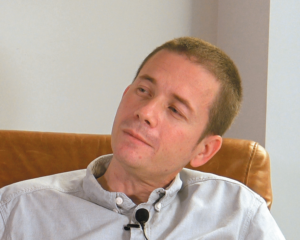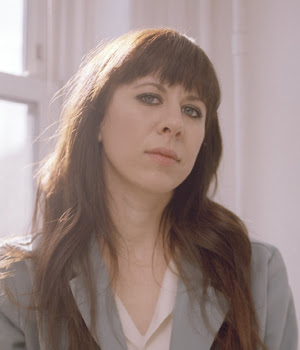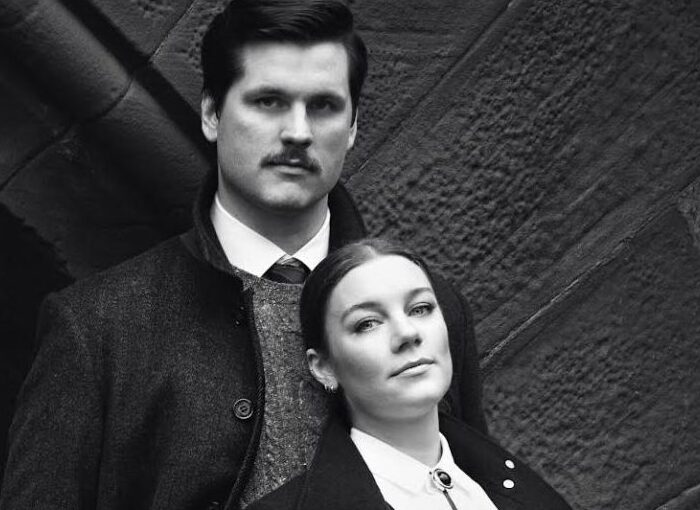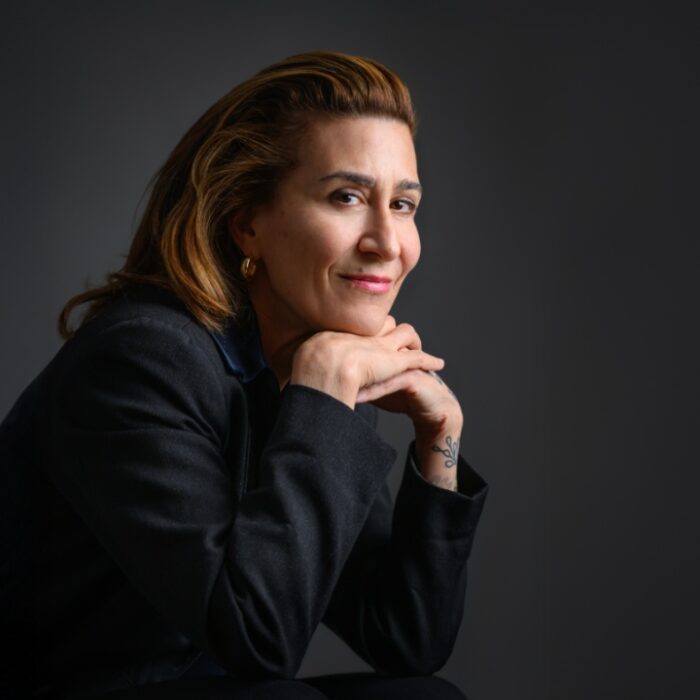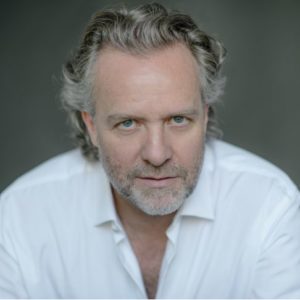
Q & A: Martin Muehle on Brazilian Music, Favorite Roles And COVID-19
By Dejan Vukosavljevic(Credit: Simon Pauly)
“The music is giving me what I need. Music has always given me what I needed in my life.”
When the COVID-19 hurricane struck humanity in full force in March, tenor Martin Muehle was about to begin rehearsals for the supernatural opera “The Queen of Spades” at the Deutsche Oper Berlin. At that moment it was obvious that his big role debut as Hermann in the gigantic Russian saga would not happen.
Muehle, who has performed such roles as Don José in “Carmen,” the title role in “Andrea Chénier,” Calaf in “Turandot,” Pollione in “Norma,” and the title role in “Lohengrin,” among others at the world’s greatest stages, started his own journey through the complex and painful mosaic of the world pandemic.
OperaWire has recently spoken to Muehle about music in his native Brazil, his favorite roles, and COVID-19.
OperaWire: Let me begin this conversation by asking how you are doing.
Martin Muehle: I am fine, thank you. Since the COVID-19 pandemic started in March 2020, I have undergone different emotional stages. I was angry, depressed, euphoric, and apathetic. It was really very interesting for me to observe how I reacted to these challenging times. This process also revealed to me how much I identified myself with my profession as an opera singer.
OW: The last few months have been extremely difficult, as we got hit by the COVID-19 pandemic. How did you deal with the situation?
MM: You know, in the last few months I have seen the message that we need music now more than ever lots of times. And I really don’t know if that is true. The need for music will be always present. I also believe there are times when we just need silence in our lives. That silence serves to amplify our ongoing need for live music.
I used to practice a lot in the beginning, but then I just stopped. Simply, I was not able to see the light in that awful darkness. I am starting to practice again now because I can see the light at the end of the tunnel.
I also began to teach. As I sang in Berlin a lot before the lockdowns, I had some friends who were interested to work with me. It was a very interesting experience. These teaching classes also gave me lots of strength to keep going.
OW: Where did you find your daily sanctuaries in order to stay calm and weather these challenging times?
MM: I have really spent a lot of time with my daughter. We have been doing some sports together, and also walked a lot. It was a bit strange because we used to distance regardless of the fact that we are family. I was cautious. That period of lockdown was a very good time to really look deeply into ourselves and see what is inside.
After that initial period of apathy, I started to learn music again. I was sitting at my piano, and the first score that I opened was the score of Puccini’s “Le Villi.” I will sing a lot of Puccini’s music at a concert performance with the Bayerische Rundfunk in October. I simply said to myself that I had to learn the music, and I also wanted to learn it very much. That learning process was a really big sanctuary for me on an ongoing daily basis.
The music is giving me what I need. Music has always given me what I needed in my life.
OW: You were born in Porto Alegre, Brazil, where five rivers converge. How did you discover your taste for classical music in such a picturesque environment?
MM: My road of discovery began in my early childhood. My father listened only to classical music. He also used to listen to it in his car. When we were traveling around the country I had the opportunity to hear lots of music by Beethoven and Mozart.
When I was six-years-old I started to play the piano. Later on, I discovered the beauty of singing in the choir, and I also learned to play the guitar. I was, and still am in love with the folk music of Brazil and Argentina.
During my childhood, we were still living under the dictatorship in Brazil. While we were in school, we had to sing our national anthem every morning. I realized how much I liked to sing just by singing this anthem.
OW: What did your musical beginnings look like?
MM: At first I attended a private Elementary School. Then my parents realized that it was not really the right choice for me. I already had that sense and love for music and for the arts. The private school did not really fulfill my musical needs. I transferred to the public Elementary School.
The new school was a big mix of people from many cultures and different levels of society. That variety provided me further insight into the world of arts. I engaged with some gaucho music, and also the guitar.
In High School, when I was 14-years-old, I started to sing in my first choir. At that time I discovered the true pleasures of singing. It was an amateur choir, but it was really a great experience. That love for music really began to grow very quickly in me at that time. I realized how much I loved singing, so I started to sing in the three different choirs. I also sang in the Choir of the Orquestra Sinfônica de Porto Alegre, where I engaged in my first serious repertoire. I sang in Beethoven’s Symphony No. 9, and Handel’s “The Messiah.”
I had a very interesting experience with one of the choirs I was singing in. A bass-baritone from Uruguay was coming there each week to give us lessons. I started my private lessons with him. I was already 18-years-old at that time. I thought that I was a baritone, but he told me that my voice was really a tenor.
And then it came to me – I really wanted to be an opera singer.
OW: How did you further develop your vocal abilities after such a big inner discovery?
MM: At first I started to watch lots of operas. I then enrolled with the Music Conservatory of Porto Alegre. I also continued my lessons with the Uruguayan bass-baritone, and he told me that I should really go to Europe in order to fulfill my musical dreams.
At that time I completed my second year with the Conservatory of Porto Alegre and decided to go to Europe. I went to Germany because I had a German passport. I come from a family of German immigrants, so I had that opportunity. I did not speak any German at that time, but that did not stop me from my intentions.
I was a bit naive then, so I started to search for a perfect teacher. I had that very romantic idea in mind, to be able to find the perfect Maestro, who will guide me through the singing process and make me a great singer. Alas, that never happened. I found a good voice teacher, but he told me that private lessons would be too expensive. He had also been teaching at the Musikhochschule Lübeck, so I auditioned there. I stayed there for five years and graduated as well.
My quest for the development of my voice was a very intensive one. I had a voice, a poor technique, and just a lot of wishing to do something. This big search involved my trip to Italy as well, to work with Carlo Bergonzi in 1993. Operatic singing can be a very difficult path and can take a lot of time to get to the place where you would like to be. It is not just glamour, but also lots of very hard work.
I started to make real progress only when I dedicated the time to myself, to teach myself how to sing properly. And that is what you can hear by listening to my performances now.
OW: Europe is a desirable destination for many opera singers. What did you find in the European operatic landscape that was attractive to you?
MM: Primarily the possibility to sing in many different countries and many different opera houses. The possibility to sing in very different languages and working in many different cultures. Europe is not geographically that large, but it has some very big opera houses and offers great performances on a daily basis. That definitely seemed very attractive to me.
OW: Let’s shift gears and talk about your roles. The role of Calaf in “Turandot” is a dream role for many tenors. You performed the role many times. How did you connect with the personality of Calaf in order to portray him credibly onstage?
MM: The role of Calaf is definitely a dream role for every tenor. As such, it also carries lots of expectations with it. “Nessun Dorma” is one of the most famous arias in the operatic universe. Each and every time I went onstage to portray Calaf, I had that in mind. Many people who have never seen a live opera performance have heard the famous Calaf’s aria.
The way that Puccini composed his operas also suits my voice very well. I can connect with the music deep inside and give it my best. The beginning of the opera sees Calaf in an already very heroic mood. And that is exactly the place where I can connect with the personality of Calaf. I am able to deeply emotionally feel the heroism that penetrates through every note that Calaf is singing.
OW: You took on the role of the famed French poet Andrea Chénier right before the lockdown, alongside Anja Harteros. How well do you resonate with Chénier, both vocally and dramatically?
MM: It was a great pleasure to sing the opera with Anja Harteros. The role of Andrea Chénier is one of the most vocally challenging roles for the tenor. It is the typical verismo role, and the orchestration makes it even more demanding. It is a very high tessitura, and it requires a lot of stamina and energy. I had to be very well prepared, both physically and emotionally for the challenges of a very long and tough singing.
Chénier is a poet. He is touched and moved with different motives, but I always felt that the right way to connect with Chénier onstage is through the music. I did not see the dramatic side as such a challenging one. After all, Chénier displays his character through the music, so I did my best to follow.
OW: The role of Don José in “Carmen” is very demanding. He eventually sinks into madness. Where did you find vocal and dramatic strengths to present Don José believably onstage?
MM: I have sung the role of Don José many times so far. Vocally, it is demanding. Dramatically, it is even more demanding. Don José starts as a young officer who seems very tough and stable. And then Carmen appears. From that moment, Don José undergoes an unbelievably strong string of emotions. Finally, he is a man ready and willing to kill. How far does one have to go for a murder?
I really do not think that he is such a good guy at the beginning. If you read the book, you will see that he has already committed a murder. That has not been so well displayed or understood in the opera. That also means that he already had problems with the violent mood and emotional outbursts. He tried to be a good officer, a good son, and a good partner for Micaela. He tried to be a good guy, but his nature proved otherwise.
Carmen is just a trigger for Don José’s deepest fears. It is not easy to connect with such a character dramatically, but if there is an understanding of his psychological profile, that is not such a daunting task. The tragedy of Don José gave me the strength to both sing the role and act as if I were the troubled person onstage. But in the end, I was an emotional wreck. The emotional toll that the role makes it very high.
OW: In December 2019 you had a big house debut at the Gran Teatre del Liceu, in the double bill of “Cavalleria Rusticana” and “Pagliacci.” Bot characters in those operas suffer and cause suffering. How did you emotionally balance between two roles?
MM: This double bill was really a great challenge and a great test for me. The truth is, this verismo combination suits my voice very well, and actually gives me lots of energy. It was not that difficult for me to connect with the Turiddu’s pain and his guilt; he practically committed suicide by going into the fight with Alfio.
From the dramatical point of view “Pagliacci” is a more complex piece. I did not find a substantial emotional link between Turiddu and Canio. Turiddu suffers, Canio suffers too. I found that link in both the music and the libretto. From that point of view, the transition was not difficult. But I felt emotionally exhausted after so much pain onstage.
OW: It is common understanding that the roles of Manrico in “Il Trovatore”, Radames in “Aida” and Pollione in “Norma” are preferably reserved for spinto tenors, due to heavier parts. As you performed these roles many times, how challenging did you find them on the vocal side?
MM: In “Il Trovatore” and “Aida” I had to make a compromise with the composer and his way of composing these operas. In “Norma” I saw this almost veristic approach to bel canto. That is why singing Pollione is so hard. All three roles really require spinto tenors in order to deal with these heavy parts in the score.
OW: You are slated to debut in another heavy dramatic role – Otello at the Staatsoper Hannover. What are your expectations? How do you prepare for the role?
MM: First, I hope to see some traditional direction of the piece. I would love to be that moor. Otello is black, and I’d like to represent that on stage. It is not that much about the color of his face, but to follow the original idea that was set by Verdi.
In a way, Otello is the high point in the career of a tenor. The music is fantastic, and Boiyo’s libretto really cuts deep into the character. I believe that I am experienced enough, at the age of 51, to tackle the complexity of Otello from both the vocal and the dramatic side.
I am preparing very slowly for now. I am approaching the libretto first, then the score. And I find everything that I need for the successful preparation in both libretto and the score. Then I need to tackle the huge complexity of emotions that Otello is radiating. It is definitely not an easy task. The role is very rich, so it is also a huge pleasure to prepare for the role and to discover those little details that might be hidden in the music and the text.
OW: Many tenors flirt with the Wagnerian line, but few dare to cross it. You crossed it with Lohengrin. What were your impressions? How comfortably did you feel taking on Wagner’s romantic character?
MM: That was actually not my only Wagnerian role. I crossed the line with Siegmund in “Die Walküre” as well. I believe that good diction is very important for both roles, and my fluency in the German language helped a lot. I have to say that I did not feel completely at home with Wagner, mostly because of the way that Wagner fit the music and the libretto. He was his own librettist. I did not fully identify with Wagner’s way of composing music. That is the only reason I do not sing Wagnerian roles anymore. It can change in the future, but I am not really certain about it right now.
OW: What are your expectations for the future, both artistically and in the light of the ongoing COVID-19 pandemic?
MM: Currently, we are all on some kind of a standby. I really hope that the effective vaccine will be found relatively soon, so we can resume our normal lives. I really expect that I will be able to return to normal performances on stage and the fully staged productions. I long to hug my colleagues during the rehearsals or after the performance. I need this contact very much in my life.
The world of opera has already changed a lot, but we will see what the future brings. I am hoping for the best.
